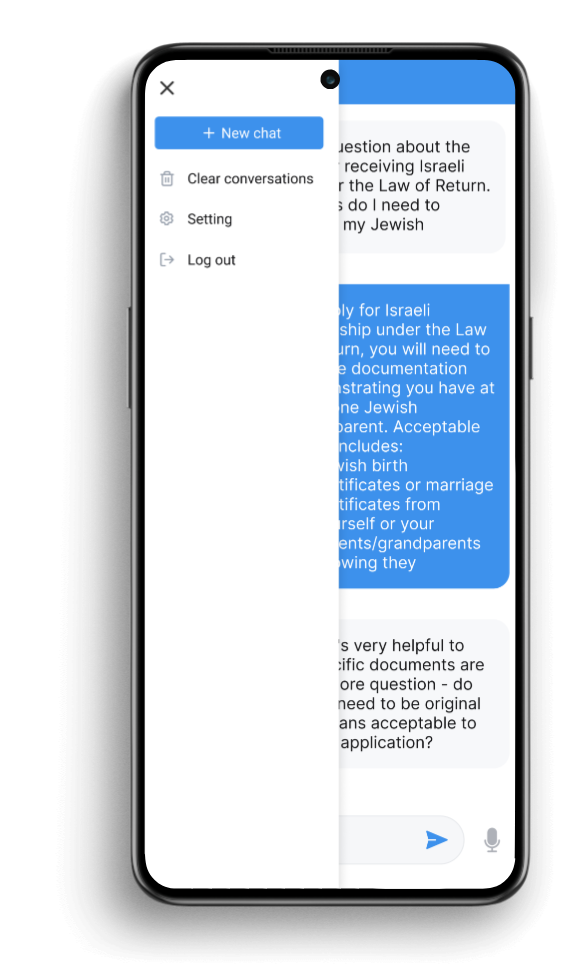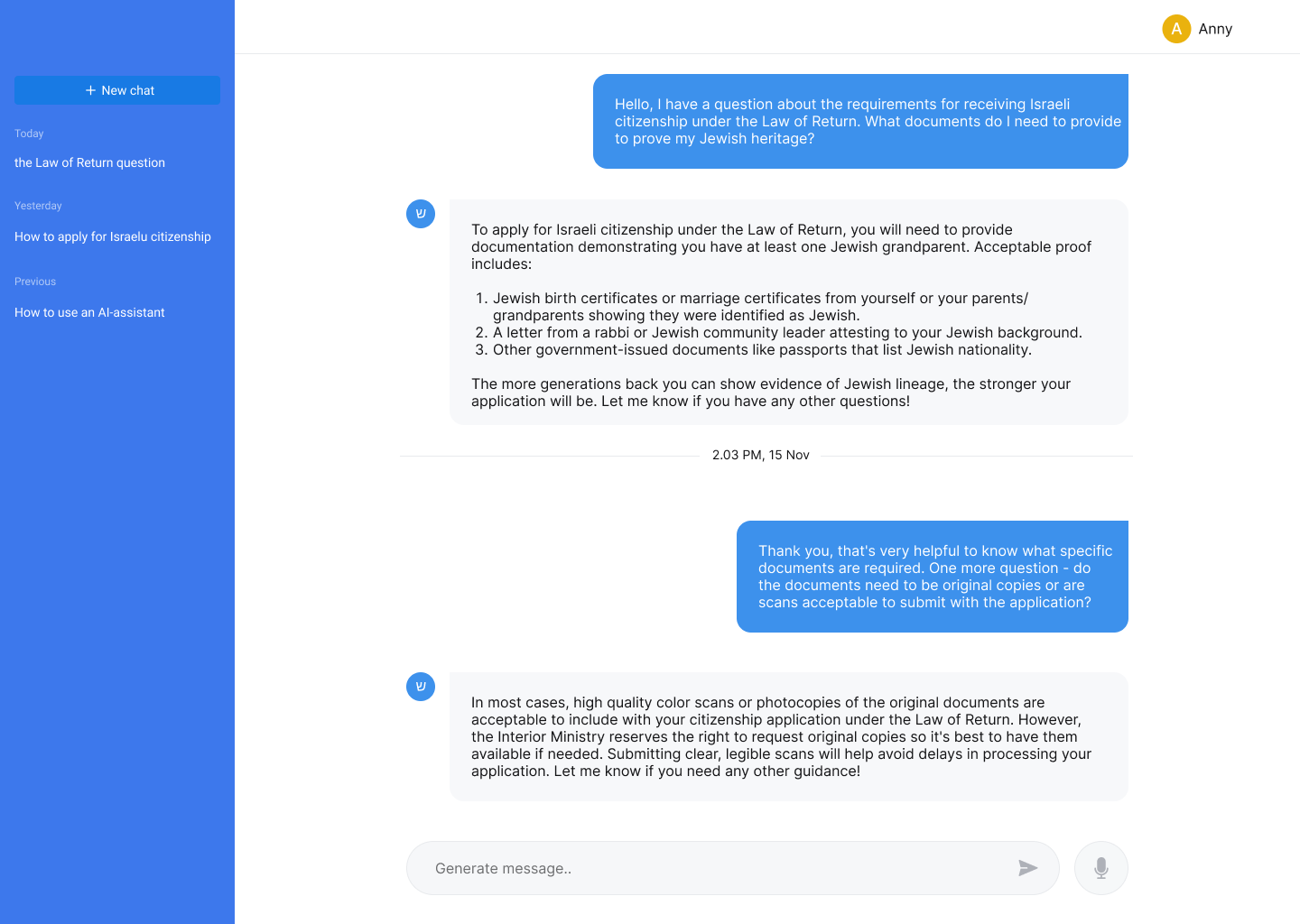AI-powered Legal Assistant for a Law Agency
Experts from Mbicycle designed an advanced AI-powered legal assistant that efficiently operates Large Language Models (LLMs) to deliver instant and accurate legal information to their users on demand.

Client & Context
Our client — an Israeli-based law agency — is a renowned legal service provider with a rich history of delivering exceptional legal solutions to a diverse clientele. They help clients across various industries, including corporate, commercial, real estate, and intellectual property. With a vision to leverage cutting-edge technologies in their services, the client approached our software development company to enhance their clients’ experience and streamline business operations with the help of AI technologies.
Challenges & Requirements
When the client approached our company, the main idea of this project was to provide their users with easy access to legal information from various sources about the possibilities of arriving in Israel officially, the list of required documents, and other consultations on related questions. To effectively implement this idea, the client needed a qualified team to integrate up-to-date capabilities and tools of Large Language Models (LLMs) into their application.
The primary challenge for our team was to develop a robust AI-powered legal assistant that seamlessly integrates LLM algorithms into the client’s workflow to provide legal services. The solution needed to be user-friendly and support multiple languages, including Hebrew and English. Among the specific challenges of this project, our specialists defined the following: the scope of work was initially unknown, and we had to calculate it at the Investigation stage, as well as the overall unpredictability of working with Artificial Intelligence.
To balance the intricacies of legal functionalities with user-friendly interfaces, our development team took careful design considerations into account. We were also required to accurately follow the regulatory compliance standards, legal documentation, and company guidelines. Despite these challenges, our team’s expertise and dedication allowed us to successfully provide an advanced AI-powered legal assistant for the client’s legal agency.
Process
We at Mbicycle believe that an effectively conducted Discovery Phase leads to a clear roadmap and a well-calculated estimation of each software solution. That’s why we started this project by conducting a Discovery Phase to investigate the project documentation and plan the entire workflow properly.
During the Discovery stage, the project team adhered to the Kanban methodology due to the inability to plan each sprint accurately. After successfully completing this stage, we chose Scrum as the main development methodology and divided the entire workflow into two-week sprints. At the end of each sprint, the project manager from Mbicycle organized a meeting between the client and the project team to discuss features that had already been implemented and those that were upcoming. We also held a few demos with the client’s team.
Following all the client’s requirements as well as the idea of implementing all the features efficiently, we at Mbicycle defined the most appropriate team that involved the following qualified experts:
- Project manager
- Business analyst
- Frontend developer
- Backend developer (Python + OpenAI expertise)
- Designer
Solution
We started working on our solution by conducting a Discovery phase with the following objectives in mind:
- Make a comparative analysis of the cost of various Large Language Models (such as OpenAI, Queue, Lama, etc.).
- Select LLMs with mandatory support for Hebrew and English languages.
- Evaluate the relevance of answers and their quality for each LLM.
- Enable users to receive answers in the same language they asked.
- Find options to let users quickly and efficiently upload documents and make queries within a category, subcategory, and the uploaded documents.
- Implement file upload functionality to extend the AI assistant’s internal database with new materials.
- Develop a question-answer history log for reviewing user activity.
- Enable batch request processing to handle multiple questions at once.
Based on the results of this phase, we chose OpenAI as the main LLM and developed a proof of concept for our AI-powered legal assistant. Our team checked the operation of the main functionality of PoC and the system’s response to correctly and incorrectly specified requests, and we also measured the system’s performance in general. After successful verification, we approved our PoC with the client and began developing an MVP for this AI-based legal assistant.

As a solution for this project, we developed a comprehensive AI-powered legal assistant with a focus on the following main features:
- Chat with AI Assistant: Users can ask questions and receive accurate answers from the AI assistant.
- Upload Files for AI Assistant: Users can upload PDF files to extend the AI model’s internal database.
- Question-Answer History Log: This log reviews the activity of all users who interacted with the AI assistant.
- Batch Request Processing: Users can upload a document with questions for batch processing.
Stages:
- Requirement Analysis: We conducted in-depth research on the project’s specific needs and objectives to define key functionalities, user personas, and implementation requirements.
- UI/UX Design: Our designer crafted intuitive UI for users and administrators, focusing on simplicity and functionality. We ensured smooth navigation and accessibility across various devices.
- Backend Development: We built a robust infrastructure to handle data processing, user authentication, and seamless communication with the OpenAI algorithms.
- Integration with the OpenAI API: Leveraging our expertise with AI-based solutions, we seamlessly integrated OpenAI into the client’s legal web application. This involved fine-tuning the algorithms to ensure accurate and relevant legal responses.
- Quality Assurance: At this stage, we conducted extensive quality assurance testing to ensure the application’s reliability and performance and eliminate bugs and issues.
Technologies & Tools
Architecture
MVP
Frontend
React.js
Backend
Python (FastAPI, Langchain, etc.), Chroma DB, AWS
Third-party library APIs
API OpenAI, Docker, GitHub Actions
Results
Working with OpenAI models, our team implemented all the required functionality from scratch to improve the client’s legal assistance. By conducting an efficient Discovery Phase, we ensured a clear roadmap and a well-calculated estimation for the project and chose the right LLM, meeting all project requirements.
By leveraging OpenAI algorithms, experts from Mbicycle have empowered the client’s audience with the following benefits:
- Enhanced Client Experience: Users benefit from instant access to accurate legal information, improving satisfaction and trust.
- Increased Efficiency: The automation of legal research and information retrieval processes has significantly reduced manual workload for lawyers and staff.
- Improved Decision-Making: The application provides timely insights and recommendations, empowering clients to make informed legal decisions.
- Competitive Advantage: The law agency stands out in the market with its innovative approach to legal services, attracting new clients and retaining existing ones.
At the moment, we successfully released the MVP of this solution and conducted a demo for the client showing all the initially stated functionality. The client’s team highly appreciated our work and has already agreed with us to develop a full-fledged AI-powered legal assistant with additional features and enhancements. We also discussed further work on integrating the legal assistant into their existing systems after the successful release of the MVP.



